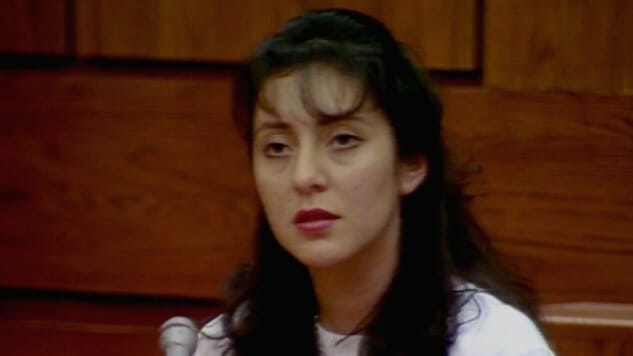Lorena and the Long Arm of the ’90s
Photo: Amazon Prime Video
For men, it dominates the shape of the case. John Wayne Bobbitt’s penis—severed with a kitchen knife and tossed in a field near Manassas, Va., on the night of June 23, 1993—becomes “the urgent matter at hand,” the embodiment of “this man’s dignity,” to be salvaged or sacrificed. It becomes “the appendage,” from which squeamish sergeants and squirming officers keep their distance, as if it might catch. It becomes the object of men’s worst fear, a fate worse than death. And then there is Lorena, the severer herself—Ecuadoran immigrant, battered wife, cause célèbre—covering her mouth to stifle a shocked chuckle at the mental image of a volunteer firefighter picking the penis from the grass and brushing it off before transporting it to the hospital in a hot dog box. In Lorena, Joshua Rofé’s involving new docuseries, there’s no more dancing around the scandal’s tragicomic implications: Twenty-five years after Lorena Bobbitt’s trial began, the time for euphemism is over.
“The p-word,” to quote John Wayne Bobbitt’s urologist (of all people), is a microcosm of the case, itself a microcosm of its cultural moment. The discomfort journalists, police officers, attorneys, and, yes, doctors evince in the series, faced with the very word “penis,” anatomizes the political atmosphere in which the Bobbitts grabbed hold of the American imagination—and, indeed, our own. By the midpoint of the first episode, Lorena laces together patriarchal mores, the media circus, and the limits of the law into a damning portrait of a nation so ill-equipped to deal with the substance of the case that it turned instead to the adolescent humor of Saturday Night Live, David Letterman, and Robin Williams. In an archival clip from Jenny Jones, John Wayne’s brother, Todd Biro, claims that he’d have killed Lorena if he’d had the chance, and the camera captures a man in the audience, applauding vigorously, as the woman seated directly in front of him stares into the distance, bemused. Cut to: Surgeon General C. Everett Koop calling violence against women “an overwhelming moral, economic, and public health burden.” Cut to: Anita Hill testifying against Supreme Court nominee Clarence Thomas. Cut to: the acquittal of political scion William Kennedy Smith in a highly publicized Palm Beach rape case, and, around the same time, the explosion of the Tailhook scandal, in which more than 100 Navy and Marine Corps officers were accused of committing sexual assaults during a four-day conference in Las Vegas. Down to multiple on-camera interviews, with the Bobbitts’ neighbors and others, in which the subjects describe their personal encounters with domestic violence, Lorena picks at the scab of “sensational” stories and finds a raw and bloody scourge.
In this, Lorena exemplifies one of the signal features of the present moment, which is its thoroughgoing reconsideration of the 1990s. On podcasts (Slow Burn), in movies (I, Tonya), and especially on television—American Crime Story: The People v. O.J. Simpson and The Assassination of Gianni Versace; made-for-TV movie Confirmation; 30 for 30 documentary The Price of Gold; and docuseries The Clinton Affair and O.J.: Made in America, the last cited as a model by Lorena EP Jordan Peele—the years Generation X author Douglas Coupland once described as “The Good Decade” emerge instead as an abortive reckoning with the problems of race, class, gender and sexuality in American life, dredging up generations’ worth of injustice only to deem the topic radioactive. In a sense, our exhumation of these and other tabloid scandals is the obverse of the recent nostalgia boom, which has given us remakes and reboots of Disney classics and broadcast sitcoms: Though our pop culture features its fair share of cheap ‘90s knockoffs, Lorena and its ilk transform that decade’s pulp into rich social histories.
The point isn’t that we’ve “solved” the problems of the 1990s. It’s that the problems of the present are inextricable from those of the 1990s, left to fester for a quarter century more or less unaddressed. No “national conversation” reduced racist policing after the Rodney King trial, so Scott Alexander and Larry Karaszewski’s 2016 dramatization of the Simpson case can be read in the context of to Black Lives Matter. No “emergency declaration” raised wages and stabilized housing and health care costs for working families after the introduction of NAFTA, so Tonya Harding’s rivalry with Nancy Kerrigan still seems a clash of upwardly mobile dreams and bitter reality. No amount of poise saved Anita Hill from being tarred and feathered by the Senate Judiciary Committee, and even her rightful treatment as a heroine of the women’s rights movement in Confirmation failed to prevent the same from happening to Christine Blasey Ford.
-

-

-

-

-

-

-

-

-

-

-

-

-

-

-

-

-

-

-

-

-

-

-

-

-

-

-

-

-

-

-

-

-

-

-

-

-

-

-

-








































